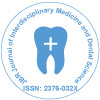Research Article
Salty Taste Threshold in Hypertensive Patients Taking Certain Types of Anti-Hypertensive Medication Compare to Healthy Individuals
Faiq Mohammad Amen*Department of Oral Medicine, University of Sulaimani, Iraq
- Corresponding Author:
- Faiq Mohammad Amen
Department of Oral Medicine
Oral Medicine Clinic of the school of dentistry
University of Sulaimani, Kurdistan region, Iraq
Tel: 07701530480
E-mail: dfaiq@yahoo.com
Received date: July 05, 2015; Accepted date: July 23, 2015; Published date: July 27, 2015
Citation: Amen FM (2015) Salty Taste Threshold in Hypertensive Patients Taking Certain Types of Anti-Hypertensive Medication Compare to Healthy Individuals. J Interdiscipl Med Dent Sci 3:184. doi: 10.4172/2376-032X.1000184
Copyright: © 2015 Amen FM. This is an open-access article distributed under the terms of the Creative Commons Attribution License, which permits unrestricted use, distribution, and reproduction in any medium, provided the original author and source are credited.
Abstract
Background: Hypertension is a chronic medical condition in which blood pressure in the arteries is elevated which affect multiple organs. Taste alteration is an oral complication caused by antihypertensive drugs which were used to treat hypertension.
Patients and methods: A single blind case control study was carried out along five successive months (December 2013-April 2014), the study was done on two hundred patients; hundred hypertensive patients who were visiting raparin hospital in Chamchamal and hundred healthy individuals who were visiting shahid peshraw clinic, taste thresholds were detected by using five different concentrations of sodium chloride solution. Each individual was given (3cc) of lowest concentration of sodium chloride solution to rinse the mouth for 30 seconds, the concentration in which the individual was able to recognize the salty taste was recorded. The data were analyzed using Mann-wittny U test.
Results: Hypertensive patients showed a significantly higher tasting ability for salt in concentrations (0.1, 0.32) (p=0.001) than the non-hypertensive individuals. There was statistically significant difference between age and salty taste disturbance in both hypertensive (P<0.05) and healthy individual (P<0.05), as well as there was statistically significant difference between sex and taste disturbance in hypertensive patients (P<0.05).
Conclusions: Salty taste threshold was decreased in hypertensive patients using certain types of antihypertensive drugs compared with non-hypertensive individuals, which may result in an increase preference for salt.

 Spanish
Spanish  Chinese
Chinese  Russian
Russian  German
German  French
French  Japanese
Japanese  Portuguese
Portuguese  Hindi
Hindi